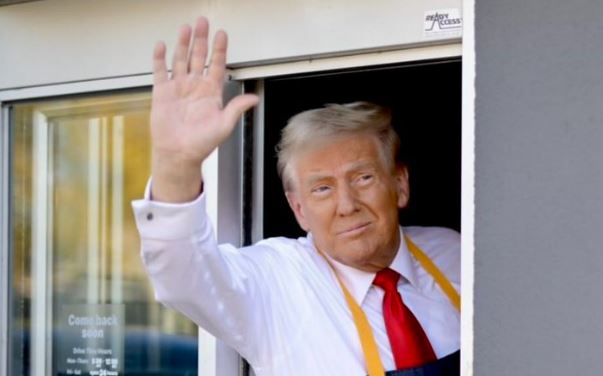— Donald J. Trump (@realDonaldTrump) October 20, 2024
While the comment sparked laughter and enthusiasm from his audience, it also highlighted Trump’s unique brand of politics—one that embraces spectacle and showmanship.
For Trump, McDonald’s has long been more than just a meal choice—it’s a cultural symbol that fits into his populist narrative. Throughout his career, he has repeatedly made references to his love for fast food, particularly McDonald’s. In 2016, during his first presidential campaign, Trump famously served McDonald’s and other fast food to visiting championship teams at the White House, making it a symbol of his disdain for political norms and his embrace of middle-class American life.
Now, as the campaign intensifies, he is once again wielding McDonald’s as a stage for political theater. His promise to “stand over that French fry” isn’t just a lighthearted comment—it’s a tactic that underscores his ability to connect with everyday Americans by engaging with elements of their daily lives.

In an age where authenticity is often questioned in political leaders, Trump’s McDonald’s move taps into the idea that he’s not above embracing the same fast food his supporters enjoy. It’s part of a larger strategy where Trump positions himself as a man of the people—someone who, despite his wealth and status, enjoys the simple pleasures of life, like working at McDonald’s, if only for 15 minutes.
Trump’s McDonald’s campaign stop also serves as a pointed contrast to his Democratic rival, Vice President Kamala Harris. In recent weeks, he has accused Harris of dodging tough interviews, citing exhaustion as a reason to avoid confronting difficult questions. By heading to McDonald’s, Trump is positioning himself as someone who, despite the grueling pace of the campaign, is willing to engage with the public in a lighthearted, yet hands-on manner.
The symbolism is clear: while Harris is avoiding objective interviews, Trump is stepping up to take part in the daily grind of regular working Americans—even if it’s just for a brief stint at the fast-food fryer. It’s a subtle, yet effective move that plays into Trump’s narrative of being the candidate who will go the extra mile to connect with voters, regardless of how unconventional the setting may be.
Trump: Strategic Populism at Play
Trump’s decision to “cosplay” as a McDonald’s worker is more than just a publicity stunt—it’s a calculated play to reinforce his populist image. For years, Trump has prided himself on being a political outsider, someone who isn’t beholden to the norms of the Washington elite. His frequent use of humor, unpredictability, and connection with blue-collar voters is a cornerstone of his political brand.

By visiting McDonald’s, Trump taps into that same populist sentiment, reminding voters that he’s not too out of touch to work in the fast-food industry, even if only for a few minutes. It’s a moment that simultaneously pokes fun at himself while endearing him to his core supporters, who see him as someone who defies the rules of traditional politics.
In contrast to the scripted nature of modern campaigns, his McDonald’s moment feels more spontaneous, even though it’s strategically planned. It’s a reminder that, love him or hate him, Trump has a unique ability to capture the attention of both supporters and critics through unconventional actions.
For McDonald’s, his stunt brings an unexpected spotlight. As one of the most iconic fast-food brands in the world, McDonald’s generally avoids overt political affiliations, preferring to maintain its status as a global brand that appeals to people across the political spectrum. However, his decision to thrust McDonald’s into his campaign puts the company in the center of a political narrative, even if only for a brief moment.

